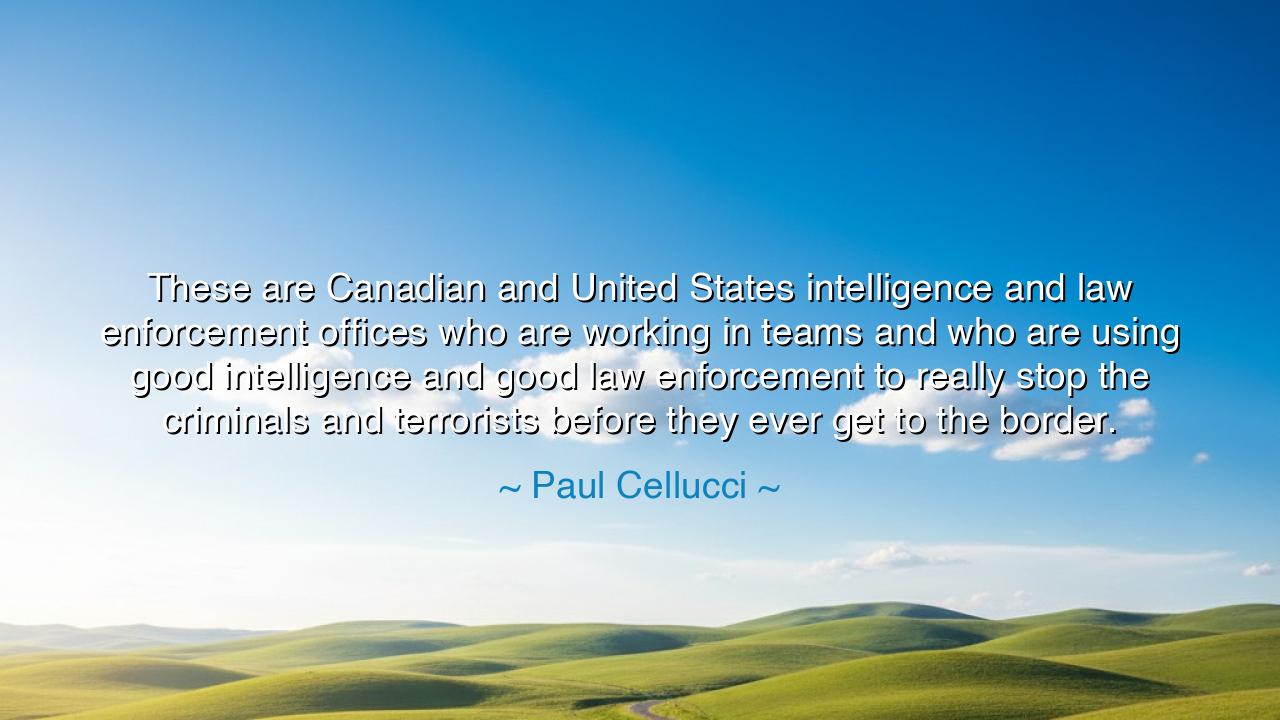
These are Canadian and United States intelligence and law
These are Canadian and United States intelligence and law enforcement offices who are working in teams and who are using good intelligence and good law enforcement to really stop the criminals and terrorists before they ever get to the border.






When Paul Cellucci declared, “These are Canadian and United States intelligence and law enforcement offices who are working in teams and who are using good intelligence and good law enforcement to really stop the criminals and terrorists before they ever get to the border,” he was not merely describing a matter of policy or international cooperation—he was speaking to the eternal power of unity, of vigilance, and of shared purpose between nations bound by trust and necessity. His words reveal an ancient truth dressed in the garments of modern diplomacy: that the safety of any people depends not on the strength of walls, but on the wisdom, coordination, and courage of those who guard them.
The origin of this quote lies in the early years of the twenty-first century, a time of global tension and transformation following the tragedy of September 11, 2001. Cellucci, then the United States Ambassador to Canada, spoke at a moment when borders once considered peaceful had become frontiers of vigilance. His statement was a reflection of a new reality—one where intelligence agencies and law enforcement officers from both nations were learning to act as one body, sharing information and trust to prevent the invisible threats of terrorism and crime. In his words resounds not the rhetoric of division, but the spirit of partnership—the understanding that in a dangerous world, cooperation is itself a form of defense.
The ancients knew this lesson well. The philosopher Aristotle wrote that friendship between states was the highest form of alliance, for it is founded not on fear, but on mutual understanding and shared virtue. When two nations act as one in purpose, as Cellucci described, they reflect this ancient ideal of philia—the love that binds not only individuals but peoples. For the border between the United States and Canada, though drawn by geography, is not a line of separation but a symbol of harmony, where two great nations stand shoulder to shoulder in the defense of liberty. Just as the ancients united to defend their cities from invaders, so too do these modern sentinels unite to defend their people from unseen dangers.
To “stop the criminals and terrorists before they ever get to the border” is not merely a matter of surveillance or strategy—it is a vision of proactive wisdom. It echoes the teachings of Sun Tzu, who wrote in The Art of War that “the greatest victory is that which requires no battle.” True strength, Cellucci reminds us, is not in reaction but in prevention; not in building walls after the attack, but in building understanding before it occurs. The intelligence that protects a nation is not just data—it is foresight, born of cooperation, discipline, and moral clarity. It is the living embodiment of prudence, one of the cardinal virtues the ancients prized most highly.
In his words, there also beats a moral heart. For the partnership between nations, especially in matters of defense, is not sustained by fear alone, but by trust and shared values. Canada and the United States, bound by centuries of friendship, act not as rivals but as brothers. Their unity in intelligence and law enforcement symbolizes a higher order of governance—one in which justice transcends borders. This spirit is the antidote to chaos, proving that peace is not maintained by isolation but by cooperation rooted in goodwill. Such alliances are the modern reflection of the ancient alliances of light, where peoples joined forces to resist the encroaching dark.
History offers many examples of how such cooperation changes the course of destiny. Consider World War II, when intelligence-sharing between nations—especially through the codebreakers at Bletchley Park—shortened the war and saved countless lives. It was not a single hero but a network of minds, working together beyond borders, that turned the tide of history. So it is in Cellucci’s vision: that the fight against modern threats requires not the solitary champion, but the collective wisdom of many nations united in vigilance. The heroes of this story are not conquerors, but guardians—men and women who labor in silence to preserve peace.
From this truth arises a lesson for every generation: unity is the highest defense, and foresight the greatest weapon. Whether among nations, communities, or individuals, the strength that endures is the strength that is shared. We are each part of a greater network of trust, and our safety depends on our willingness to cooperate with integrity and respect. Let none of us imagine that we can stand alone in an interconnected world; the wise know that to guard one another is to guard ourselves.
Thus, let the voice of Paul Cellucci echo as a teaching for the ages: work together, share knowledge, and act with foresight. Whether in the affairs of states or the choices of daily life, the path to peace is not isolation but collaboration. The vigilant spirit that sees danger afar and unites with others to meet it—that is the spirit of civilization itself. For when intelligence is joined with compassion, and power with purpose, no darkness can cross the border of a people united in light.






AAdministratorAdministrator
Welcome, honored guests. Please leave a comment, we will respond soon